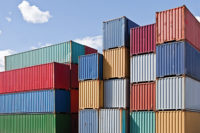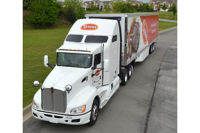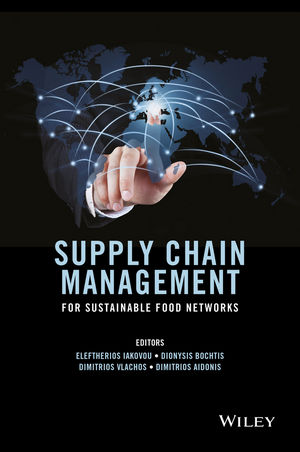Tyson Foods Receives Award at 2014 Food Logistics Forum




Marina Mayer, editor-in-chief of Refrigerated & Frozen Foods, presented Tyson Foods with its fourth annual Sustainable Supply Chain of the Year award at this year’s Food Logistics Forum. Brad Pierce, transportation manager for Tyson Foods, was on hand to receive the award. Here's what Pierce had to say:
“It’s an honor for Tyson Foods to be recognized this way. We have always tried to do things the ‘right’ way and looked for ways to be more efficient in our processes. However, it wasn’t until about 10 years ago that we recognized sustainability as journey that needed greater focus. And, because for us, sustainability isn’t just about the environment, many of the recognition programs haven’t looked closely at our accomplishments. We appreciate Refrigerated & Frozen Foods for telling what we believe is a really good success story,” says Pierce.
At Tyson Foods, we define sustainability as doing the right thing in all aspects of our business, so our company can stand strong for many years to come. It involves building responsibility and accountability into everything we do. To break it down, sustainability is about four things—people, planet, products and profit. This includes such important things as food safety, worker health and safety, water and energy conservation and animal well-being. It also involves maintaining a strong bottom line, since we must manage our financial resources first in order to pay for our social, environmental and product-related efforts. It truly is, as the article stated, about making a difference one sustainable initiative at a time.
I work in our transportation division. In many ways, transportation is part of the foundation of our sustainability efforts. Ten years ago, Tyson became a charter member in the EPA’s SmartWay Transport program. The program is built around the goal of moving goods from place to place in the cleanest and most efficient way possible, reducing fuel consumption while reducing pollution and greenhouse gas emissions. Being part of this program has kept us focused on a cycle of continuous improvement. Some of our success stories include investing in ultra-light equipment. Doing this has allowed us to put more product on our trucks. By increasing the weight, we don’t need to make as many trips. During our last fiscal year alone, this resulted in 2 million fewer truck miles being driven.
We’ve also been smart about integrating rail into our processes, which saved more than 55 million truck miles during fiscal 2013. All told, over a 3-year period, we have eliminated more than 200 million over-the-road truck miles. To put that into perspective, that distance would get us to the sun and back, plus another 30 or so round trips to the moon, and that’s distance we didn’t have to drive. And, for the miles we do drive, last year we replaced older equipment with more than 200 new tractors that are SmartWay-certified, complete with battery and electric-powered auxiliary power units to reduce idling time, which reduces emission. We also purchased more than 200 new trailers that are fitted with drag-reducing wind skirts that offer even more potential fuel savings.
Tyson’s private fleet is constantly evaluating ways to further reduce emissions, fuel consumption and greenhouse gases, while getting the best miles per gallon we can. And, for us, it doesn’t stop there.
The principles of sustainability—and specifically those of the SmartWay program—are so important to us, we require any third-party carriers hauling loads for us to be a SmartWay carrier. Effective sustainability enables Tyson Foods to reinvest in each of the business categories where we compete, which helps drive, for example, our frozen foods business. We have increased our consumer advertising three years running and the frozen poultry category has performed well in what has been a very challenging environment for the overall freezer. Tyson’s commitment to reinvest in that category is enabled in part by a diligent effort to improve supply chain efficiency. That makes this a win for our products and the people who buy them, while at the same time being a profitable business that is proud to be doing its part to be a good steward of our planet.
On behalf of the 115,000 Tyson Foods team members around the world, again I thank you for this award. We are honored and grateful for your recognition and support."
The Food Logistics Forum, hosted by the American Frozen Food Institute (AFFI), McLean, Va., took place June 1-3 at the Hyatt Regency Lake Tahoe in Incline Village, Calif. Frozen food industry leaders—from production, foodservice and retail to 3PL providers— attended education sessions that focused on a variety of import and export transportation issues, including labor negotiations at West coast port terminals and new Food Safety Modernization Act regulations.
In case you weren't able to attend, here's a brief synopsis of what you missed:
The conference kicked off with an opening session on supply chain management from Dr. Ron Lembke, associate professor of supply chain management at the University of Nevada, Reno, Nev. Lembke talked about fracking, the supply and demand of energy, rising transportation costs, carbon footprint reduction, the financial risks of the Carbon Disclosure Project and sustainability.
“If it’s not profitable, it’s not sustainable,” he adds.
Gary Kushner, partner at Hogan Lovells US LLP, Washington, D.C., discussed the Sanitary Transport Rule, and outlined what types of foods are covered under which rules. The goal is to prevent food from being adulterated, he says.
“If it’s not written down, it didn’t happen,” Kushner adds.
The forum continued on with a panel discussion on the transportation issues at ground level, moderated by Nick Langel, senior product manager for Union Pacific, Omaha, Neb. The panel included: Allen Deasy, director of food and consumer marketing for CSX Transportation, Jacksonville, Fla., who talked about innovations in rail service, how co-loading maximizes transportation efficiencies and how mobile tools enable better visibility and planning. Herman Haksteen, chief executive officer of MHW Group, Owings Mills, Md., talked about providing end-to-end asset-based supply chain solutions, such as super-insulated boxcars, accurate data, visibility, GPS tracking units and racks and straps that can be built into any railcar. And, Ricky Stover, vice president of intermodal sales with CR England rounded out the discussion with how his Salt Lake City, Utah-based company has evolved over the years, brining up-to-date supply chain solutions.
Peter Friedmann, executive director at the Agriculture Transportation Coalition, Washington, D.C., talked about transportation policies and infrastructure.
“There is nothing that [Americans] produce that you can’t get anywhere else in the world, so it must be affordable and fresh,” he adds.
That being said, he outlined how automation has revolutionized terminals and how the Los Angeles and Long Beach ports may grind to a halt come July as a result of the port truck drivers on strike to protest alleged labor violations.
“Ports are key to keeping the import/export structure in place,” Friedmann adds.
Kraig Naasz, president and CEO of AFFI, spent 30 minutes discussing the organization’s newest campaign, “Frozen. How Fresh Stays Fresh.” While 97% of the frozen food industry remains flat or down, breakfast, dessert and frozen fruit segments are on the rise. Naasz outlined how AFFI’s national campaign urges consumers to take a fresher look at frozen foods.
Then, Christy Braun, risk management consultant, Nationwide Insurance, Columbus, Ohio, talked about food chain integrity, who’s impacted, what applies and what food manufacturers should be doing to remain compliant with the rules.
On June 3, the conference continued with a cold storage roundtable, moderated by Chris Murphy, president of Sierra Pacific Warehouse Group, Modesto, Calif. Russ Lytle, regional manager of Columbia Colster, Moses Lake, Calif.; Scott Chapman, senior vice president of sales and marketing for Lineage Logistics, Colton, Calif.; Todd Lanter, director of transportation for Henningsen Transportation Services, a division of Henningsen Cold Storage Co., Hillsboro, Ore.; and Tim Egan, vice president of business development for Americold, Atlanta, all discussed the increase in fresh and refrigerated within their frozen spaces, how hours of service can change inbound and outbound and the impact of solar panels and LED lighting on their facilities.
The conference concluded with a discussion on the Panama Canal expansion from Michael Gargaro, consultant for GKSF Global Research, Orinda, Calif. Takeaways from this presentation were: the expansion is 75% complete with a projected completion timeframe of December 2015; it will open up new entrance channels and locks and allow for expanded ship sizes (13,000 TEUs); new services will affect strings and port calls; and carriers will have to rely on relay ports to maximize vessels.
To learn more about Refrigerated & Frozen Foods’ Sustainable Supply Chain of the Year award, check out the May 2014 issue. To nominate a company for next year’s award, check out the nomination form here. Food Logistics Forum 2015 will take place May 31-June. Go to www.affi.org for more information.
Looking for a reprint of this article?
From high-res PDFs to custom plaques, order your copy today!










